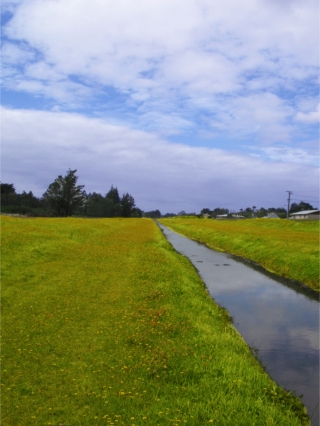So it's farewell to our house in Christchurch. The morning of settlement day was bleak and stormy, and so dark that I had to switch on the sitting-room lights. The house reminded me of its former self -- as it was on the evening when we first moved in: gloomy, echoing, and with a faint odour of floor-polish.
The new owner, Rob, arrived in an industrial-strength raincoat, and splashed his way to the front porch. We had to raise our voices to be heard above the noise of the river. Overnight the Avon had turned into a rushing torrent, with branches and small trees being swept downstream.
"Does it ever flood?" asked Rob.
I handed him the keys to his new house. He stepped inside and gazed at the wooden floors and rimu-panelled interior. His face took on the resigned expression of a man whose wife is an enthusiast for arts-and-crafts-movement architecture.
The rain had become even heavier by the time I parked outside Jennifer's office. Most of our household effects were in storage, but a few essential travelling items had been temporarily stashed here for safekeeping. At the time, Jennifer had expressed concern over the sheer volume of paraphernalia that I had deemed to be essential, but I'd reassured her that my highly-trained engineer's brain could visualize how everything would fit perfectly into our car.
Predictably perhaps, I could only squeeze in about a third of the essential items. I explained to Jennifer that the interior spaces in Citroëns tend to be triangular rather than square, and this had caused me to misjudge the amount that could be carried. Sensing that something had gone awry, Bob-the-baby began to scream at the top of his lungs.
We unpacked the contents of all the boxes, and -- shielding them as best we could from the torrential rain -- discarded everything that was not absolutely critical. This time I managed to fit in about half the items. We stood, defeated and dripping, and contemplated our predicament. Over Bob-the-baby's deafening sobs, Jennifer suggested that my acoustic bass might not, after all, be absolutely essential. She made the astute observation that an acoustic bass is somehow exactly opposite in shape to the boot of a Citroën.
We carried the bass up to her office, and transferred the contents of some of our boxes into plastic bags, so that they would squish up with greater triangularity. This time almost everything fitted into the car. I pushed down on the boot-lid with my full body weight, and it clicked softly shut.
The rain stayed with us all the way to the Rangitata river. By the time we reached Temuka, it had faded to a damp drizzle; and in Timaru, of all places, we suddenly emerged into dazzling sunshine.
We stopped for lunch. Above our heads, the South Canterbury sky -- implausibly blue, and populated by aimless, sponge-like clouds -- looked as if it had been designed by a special effects department.
All afternoon we drove steadily southward: traversing a parched and rumpled Otago, and then out into the river-meadows of Southland. After the town of Gore, we left the main highway and headed towards the ocean. On either side of the road, contented-looking cows gazed at us from trim pastures -- their intelligent faces filled with inscrutable bovine thoughts.
At Riverton we could go no further southward. The town -- founded as a fishing settlement in 1835 -- is almost prehistoric by New Zealand standards. Fishing boats still work here, moored to a broken-down wharf that wanders out into the lagoon. There is a small library, a church, and a grand two-storey brick villa with a sign that says "Fresh Laid Eggs".
We stopped to buy some bread and a few other supplies, and drove the last leg of the journey -- to our new home, a weather-beaten crib on the sea-front, some distance from the town.
After only a fortnight we have already begun to develop our daily rituals. In the morning, while Jennifer has her bath, Bob-the-baby and I wander down to the seashore and look across at Stewart Island (or, more frequently, to the fog that obscures the island). At about five o'clock, we go for another walk, and Bob encourages me to buy a pint of beer.
It's been a number of years since I've lived in a small town, and I'd forgotten the pleasant feeling of Gemütlichkeit that it gives. Up north, somewhere far away, there are traffic jams, homeless people, drug-dealers, murderers, and Paul Henry. But here we have only the oyster-catchers, and Foveaux Strait, and a handful of fishing-boats in the lagoon.
It will do us for a while.


